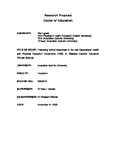Doctor of Education Research Proposal - Evaluating school responses to the new Queensland Health and Physical Education Documents (1999) in Brisbane Catholic Education Primary Schools.
| dc.contributor.supervisor | Hansen, PJ | en |
| dc.contributor.supervisor | Warren, E | en |
| dc.contributor.author | Lynch, TJ | en |
| dc.date.accessioned | 2016-10-09T19:40:23Z | |
| dc.date.available | 2016-10-09T19:40:23Z | |
| dc.date.issued | 2003-11-24 | en |
| dc.date.submitted | 2003-10-30 | en |
| dc.identifier.uri | http://hdl.handle.net/10026.1/6487 | |
| dc.description.abstract |
Within Brisbane Catholic Education (BCE) the new HPE syllabus (1999) was implemented between 1999 and 2001. The purpose of the study is to explore the implementation of the new Queensland HPE syllabus (1999) in three BCE primary schools of varying enrolment numbers. The research problem is: ‘How developed is the implementation of the new HPE syllabus in BCE schools?’ The data collection will be guided by the following research questions:- • How are teachers implementing the HPE curriculum documents? • What readily accessible resources do schools have to assist with the implementation of Health and Physical Education? • What are teachers’ perceptions of the importance or otherwise of HPE as a Key Learning Area? • What are the children’s perceptions of the HPE Key Learning Area? This study is significant for the feedback it will provide to BCE of the HPE syllabus implementation process and in informing BCE of the current status of the HPE key learning area within a sample of systemic Catholic primary schools. The findings have the potential to contribute to the BCE Strategic Renewal Framework currently occurring within BCE schools for all curriculum areas and which is planned for completion by the end of 2006 (BCE, 2003b). This research has been designed within a constructionist paradigm. An interpretivist study will be conducted employing symbolic interactionism. This qualitative, interpretive study is most appropriate as meanings will be constructed. The methodology chosen to construct meaning through capturing the context of each school is case study. The sites for the three case studies will involve: one small sized BCE primary school (less than 200 students); one medium sized BCE primary school (200 - 400 students); and one large sized BCE primary school (over 400 students). The participants will be teachers and students from the respective schools. The research instruments to be used to capture significant and relevant data are; semi structured and focus group interviews, reflective journal notetaking, observations and document analysis. | en |
| dc.language.iso | en | en |
| dc.subject | Implementation | en |
| dc.subject | Curriculum | en |
| dc.subject | Primary schools | en |
| dc.subject | Health | en |
| dc.subject | Well-being | en |
| dc.subject | Physical Education | en |
| dc.title | Doctor of Education Research Proposal - Evaluating school responses to the new Queensland Health and Physical Education Documents (1999) in Brisbane Catholic Education Primary Schools. | en |
| dc.type | Thesis | |
| plymouth.organisational-group | /Plymouth | |
| plymouth.organisational-group | /Plymouth/Faculty of Arts, Humanities and Business | |
| plymouth.organisational-group | /Plymouth/Faculty of Arts, Humanities and Business/Plymouth Institute of Education | |
| rioxxterms.licenseref.uri | http://www.rioxx.net/licenses/all-rights-reserved | en |
| rioxxterms.type | Thesis | en |
| plymouth.oa-location | http://media.wix.com/ugd/842c5e_ae5c55ab88ed4b0ab13455480bc1aa95.pdf | en |


